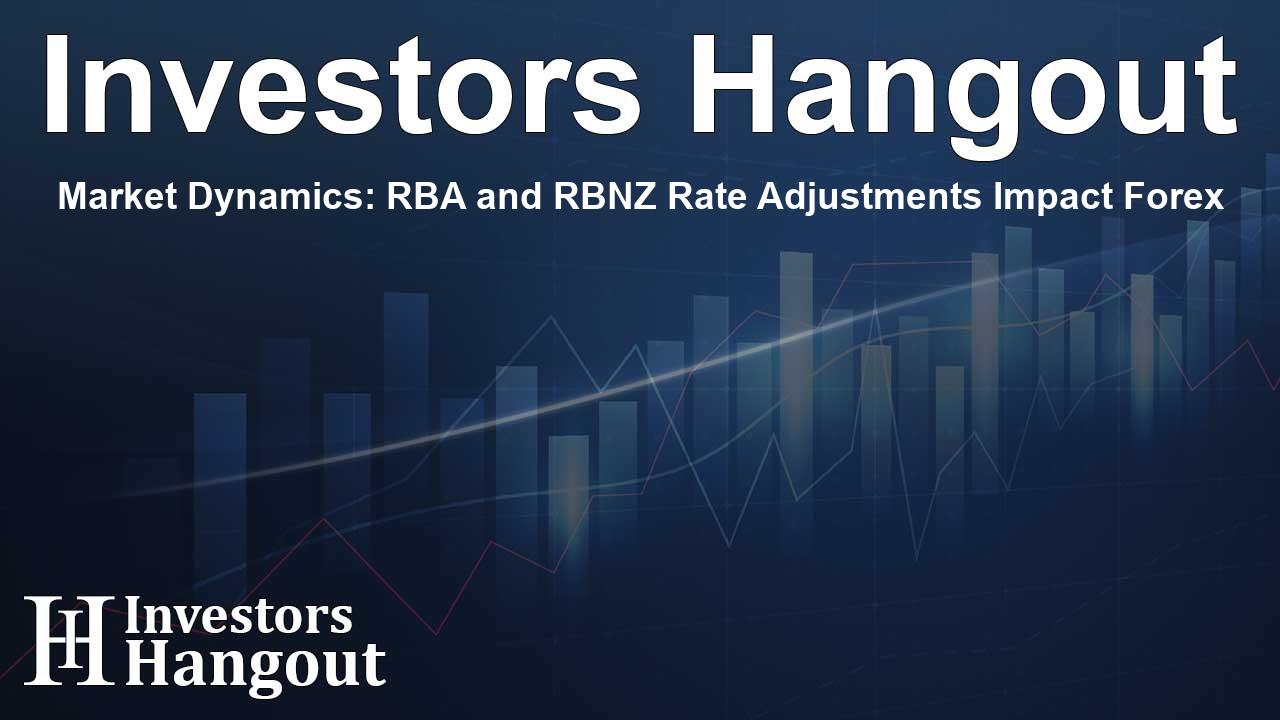Market Dynamics: RBA and RBNZ Rate Adjustments Impact Forex

Shifting Forex Landscape Amid Rate Changes
The US dollar is stabilizing as traders prepare for the upcoming Fed minutes, reflecting cautious optimism within the market. After experiencing a dip against its major counterparts, the dollar demonstrated resilience earlier this week. This fluctuation occurs amid a relatively quiet period for US economic data, as the country observed a holiday recently.
Despite the calm, remarks from three Fed officials have kept investors on their toes. Philadelphia President Harker and Governor Bowman highlighted the current strategy of maintaining unchanged interest rates, cautioning that any anticipated changes revolve around evolving economic conditions. Governor Waller took a slightly dovish stance, suggesting that the ongoing tariffs might have a more muted effect on inflation than previously feared. As investors expect the Fed minutes to provide insights into the Fed's policy direction, the market anticipates potential adjustments in response to inflationary pressures.
Japanese Yen on the Rise Amid Economic Data
On the other side of the globe, Japan's currency, the yen, has emerged as a notable performer, spurred by optimistic GDP figures. This data supports an expectation of further rate hikes from the Bank of Japan (BoJ) within this year. Market sentiment suggests a solid 80% probability that the next hike could materialize in July, leading to revised forecasts about Japanese economic strength.
Meanwhile, the euro seems to be struggling, caught in the currents of global trade discussions. In light of upcoming peace talks regarding Ukraine, traders are skittish. The significance of diplomatic engagements between the US and Russia cannot be overstated, as they may shape investor sentiment in the eurozone and beyond.
RBA Initiates Easing Cycle Cautiously
Turning to Australia, the Reserve Bank of Australia (RBA) has initiated its much-anticipated easing cycle with a modest 25 basis point rate cut. This decision, while expected, was accompanied by a tone of caution regarding future adjustments. Initially, the Australian dollar surged on the announcement, but its gains quickly diminished. As traders assess the likelihood of additional cuts, the market anticipates an overall 40 basis points reduction in the near term.
The RBA’s meeting signals a pivotal change in approach, and it shines a light on a broader trend among central banks reevaluating their strategies against a backdrop of fluctuating economic indicators.
Eyes on RBNZ: Anticipating the Next Move
As the trading week progresses, the focus shifts to the Reserve Bank of New Zealand (RBNZ), which is expected to follow suit with a substantial 50 basis point cut. Given the current economic climate and the challenges posed by earlier disruptions, including tariffs and recessionary pressures, traders seek clarity on the RBNZ's guidance for the months ahead.
Governor Orr’s upcoming statements will be critical, particularly on how they will manage potential future cuts in the face of pressing economic challenges. The market is poised to react not only to the rate reduction but also to any forward guidance offered by the RBNZ, which will likely influence the kiwi's performance.
US Stock Futures Indicate Higher Open Despite Market Fractures
In North America, all eyes are on the stock market as US stock futures indicate a positive start following a brief hiatus. With Wall Street experiencing a closure, the anticipation of future tariffs has created an air of uncertainty. President Trump's recent comments regarding reciprocal tariffs imply potential challenges ahead. However, the projected implementation timeline of these tariffs may offer some short-term relief to traders as they navigate through these economic waves.
Frequently Asked Questions
What factors are influencing the US dollar's stability?
The US dollar's stability is influenced by market expectations regarding the Federal Reserve's minutes, interest rate decisions, and overall economic indicators.
How is the RBA's rate cut affecting the Australian dollar?
The RBA's cautious 25 basis point cut led to an initial rise in the Australian dollar, but later losses reflect concerns about further cuts.
What can traders expect from the RBNZ's next meeting?
Traders anticipate a possible 50 basis point cut from the RBNZ and seek details on future monetary policy directions amid a challenging economic climate.
Why is the yen gaining strength at this time?
The Japanese yen's strength is attributed to encouraging GDP data, which has fueled speculation of further rate hikes by the BoJ.
How are global economic dynamics affecting forex markets?
Global economic dynamics, such as trade policies, monetary policy decisions, and geopolitical events, are significantly impacting forex market movements and currencies’ performances.
About The Author
Contact Addison Perry privately here. Or send an email with ATTN: Addison Perry as the subject to contact@investorshangout.com.
About Investors Hangout
Investors Hangout is a leading online stock forum for financial discussion and learning, offering a wide range of free tools and resources. It draws in traders of all levels, who exchange market knowledge, investigate trading tactics, and keep an eye on industry developments in real time. Featuring financial articles, stock message boards, quotes, charts, company profiles, and live news updates. Through cooperative learning and a wealth of informational resources, it helps users from novices creating their first portfolios to experts honing their techniques. Join Investors Hangout today: https://investorshangout.com/
The content of this article is based on factual, publicly available information and does not represent legal, financial, or investment advice. Investors Hangout does not offer financial advice, and the author is not a licensed financial advisor. Consult a qualified advisor before making any financial or investment decisions based on this article. This article should not be considered advice to purchase, sell, or hold any securities or other investments. If any of the material provided here is inaccurate, please contact us for corrections.
